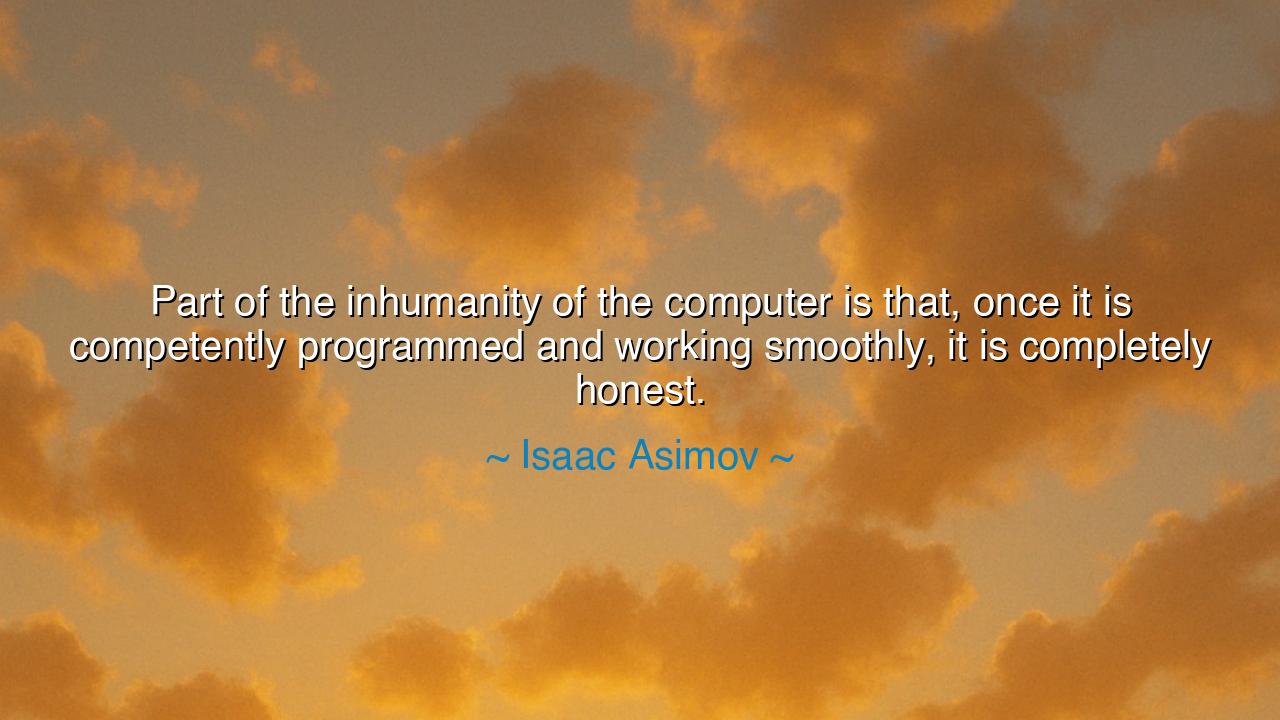
Part of the inhumanity of the computer is that, once it is
Part of the inhumanity of the computer is that, once it is competently programmed and working smoothly, it is completely honest.






In the sweeping current of human progress, we encounter tools of such profound power and precision that they can both elevate and disturb us. Isaac Asimov, in his insight, "Part of the inhumanity of the computer is that, once it is competently programmed and working smoothly, it is completely honest," speaks to a truth that haunts the very nature of technology. The computer, once imbued with the wisdom of its creators, becomes a machine of cold objectivity—free from the biases, contradictions, and imperfections that define human nature. In this honesty, however, there lies a certain inhumanity, for while the computer may provide clarity, it does so without the nuance of emotion, compassion, or the complexity of the human soul.
The ancients, too, grappled with the question of honesty and truth. Socrates, the great philosopher of ancient Athens, famously declared that "the unexamined life is not worth living." For Socrates, truth was something that required constant reflection, debate, and the examination of the soul. Truth was not something fixed or absolute; it was a dynamic process that involved humanity, with all its flaws, doubts, and conflicts. The computer, by contrast, offers a stark honesty—a truth devoid of the messiness of human life. In this sense, the computer is a mirror that reflects not the complexities of human experience, but the absolute logic of its programming. Once set in motion, it offers answers that are immutable, yet also devoid of context or emotion.
Consider the story of Julius Caesar, the Roman general and dictator, whose rise to power was marked by decisiveness, clarity, and ruthlessness. Caesar, in his conquest of Gaul, demonstrated the qualities of a leader who, much like a computer, was capable of clear and logical actions. Yet, Caesar's ability to make decisions without the moral complexity that often hinders others was both his strength and his weakness. As he marched forward with brutal clarity, he lacked the deeper reflection that would have made his actions more human. His unyielding honesty in battle mirrored the qualities of the computer: a relentless efficiency without the burden of human doubt. But this, as Asimov suggests, is where the inhumanity lies. The computer, like Caesar, executes its task without hesitation, without conscience, and without mercy.
In contrast, the human spirit is defined not by rigid honesty, but by the ability to navigate the gray areas of life. The truth that we seek is not one that can be reduced to facts alone but must be understood through the lens of experience, emotion, and wisdom. Confucius, in his teachings, emphasized that wisdom is found not in the literal truth, but in the understanding of context. He believed that the wise person could see beyond the surface and recognize the complexity in every situation. Computers, however, are unable to perceive this complexity. Their honesty is in the data they process, not in the meaning behind the data. This lack of understanding creates a distance between the machine and the human—a distance that speaks to the inhumanity Asimov refers to.
The lesson in Asimov's words is not that we should fear technology, but that we must recognize its limitations. The computer, with its honesty, offers a kind of truth that can be helpful in many contexts. But it lacks the depth of understanding that comes from human experience—the kind of insight that comes from knowing sorrow, joy, conflict, and love. While the computer may calculate the shortest path or answer the most complex questions, it cannot comprehend the moral implications of those answers. Humans, by contrast, are uniquely equipped to wrestle with ambiguity, to reflect on their own motivations, and to understand the world through the lens of emotion.
In practical terms, this means that we must use the computer not as a replacement for human judgment, but as a tool to enhance our decision-making process. When faced with decisions, whether personal or professional, we must recognize that honesty alone does not guarantee rightness. Logic and reason, though invaluable, must be balanced with wisdom, compassion, and empathy. The computer is a tool that can help us find solutions, but it cannot replace the moral compass that guides us through the complexities of human life.
Ultimately, Asimov's reflection calls us to embrace technology with both appreciation and awareness. We must not allow the honesty of the computer to blind us to the complexity of the human experience. While technology can help us make decisions faster, it is the human spirit, with all its imperfections, that gives those decisions meaning. As we move forward in this age of digital transformation, we must remember that true wisdom lies not in machines, but in our ability to use them wisely—recognizing their strengths, acknowledging their limitations, and always embracing the depth of the human experience.






AAdministratorAdministrator
Welcome, honored guests. Please leave a comment, we will respond soon